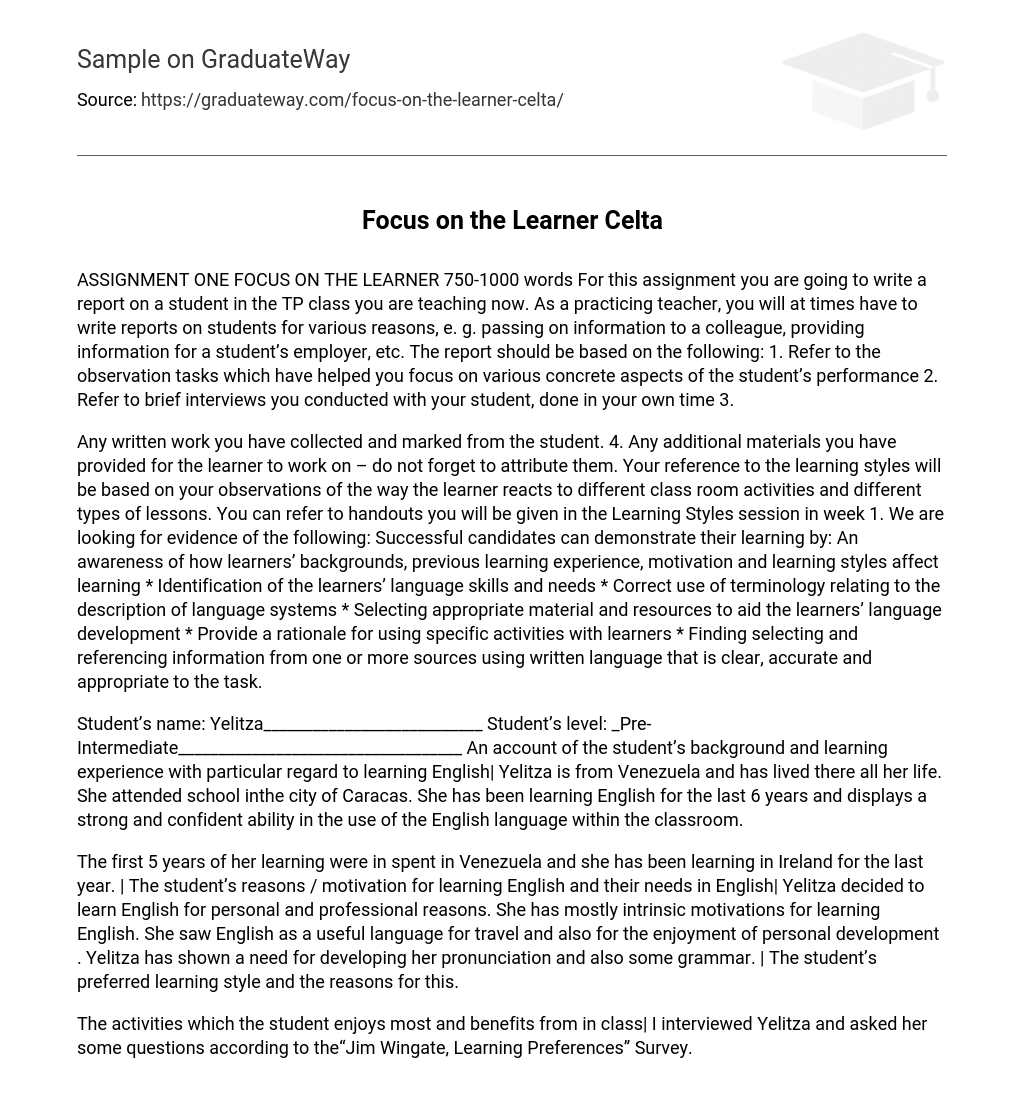For this assignment you are going to write a report on a student in the TP class you are teaching now. As a practicing teacher, you will at times have to write reports on students for various reasons, e. g. passing on information to a colleague, providing information for a student’s employer, etc. The report should be based on the following:
- Refer to the observation tasks which have helped you focus on various concrete aspects of the student’s performance
- Refer to brief interviews you conducted with your student, done in your own time
- Any written work you have collected and marked from the student.
- Any additional materials you have provided for the learner to work on – do not forget to attribute them.
Although it can be a good method of self learning I feel like in that time searching for meaning distracted her from the main aim which was to practice reading for gist. Writing: Yelitza is also confident with her writing. It is clear and wellpresented. She uses her listening skills to scribe answers while listening. She can write well and at a good speed in English which highlights her fluency. I noticed on a task that Yelitza had completed that she had a spelling mistake. “aproximalitly”. She took a risk in using the language and writing it downbut spelling could be practiced.
Listening
Yelitza shows good strengths in her listening skills. She engagedwell in the listening tasks that were set during class. She easilyselected answers from the tape. Yelitza also shows a good ability to listen to native speakers and understandthe diverse changes in local accents and rhythms. Again this her skills in listening highlighted her level of fluency as she easily adapted to dialects etc. Speaking: Yelitza has a good level of speaking skills. She engages in allconversations in both Student to student, teacher to student and also group discussions.
She enjoys talking with people and views every conversation as a chance to practice and develop her language and speaking skills. Some areas of Yelitza’s speech are dominated by her Hispanic rhythm andpronunciation of sounds. Yelitza tends to sound the “V” for ‘b’ in pronunciationof words presented and while speaking.
Grammatical Ability
Yelitza shows a good level of understanding grammarand its structures. She engages in the task and challenge of using the rightgrammar. Her willingness to learn and practice is of a benefit to her learning. Within her spoken language Yelitza often confuses components of the personalPronoun. Although she correctly selects the pronoun he/she etc when she joins tthe verb she often omits endings (s) for example ‘he get the bus everyday’
Pronunciation
Yelitza can be understood very well and appears to makea conscious effort with her words while she speaks. There are very few wordswhich Yelitza finds difficult to use in her language. She tends to drop the stress of the Consonant in some words. “I often ea(t) brefas in the morning” According to “Learner English” by Michael Swan and Bernard Smith, Yelitza’sPronunciation weakness stems from her mother tongue being Spanish. They state that Consonant clusters are not frequently used for the Spanish speaker and so when the Learner is using the English language they tend to drop the final consonants in English words.
Range of vocabulary
Yelitza has a good range of basic vocabulary and comprehension. Sheunderstands a lot of the words that have been stumbling the other students. The word “footpath” was used in my lesson and where other students neededan explanation, Yelitza was part of the group who knew this vocabulary. Yelitza can sometimes find difficulties in the fluency of posing a question.
Instead of using the question form she will use a question tag (described inSwan’s Learner English book). This form of question is natural for Yelitza. Although she understands how to form a question her natural speech istransferred when she is speaking English. Some suggestions for ways in which the students could be helped to improve in the areas of weakness mentioned. in the previous section. Provide at least three exercises/tasks that would help the learner improve. You can source from library or devise your own.
You must attach these when submitting as exercises you would give the student to do independently at home. For Yelitzas pronunciation, I would give her a task which enabled herto work on the final sounds of words. This would help her individually hear and determine the sounds at the end of words. In particular with Yelitzas first language being Spanish I would focus on the s/z endings. As learner Yelitza must recognize the difference presented between English and Spanish pronunciation of s/z, paying particular attention to their phonetical roles withinwords.
Tasks set would include reading and selecting words that end in either s or zin sound highlighting and developing phonological awareness and word endings. As mentioned posing questions within the English language differs from thatof the Spanish language. Whereas in Spanish the statement is made into a question by adding a yes/no at the end- a question tag in English a question isformed through the use of the interrogative. Yelitza as learner must explore the use of the interrogative rather than the direct translation from Spanish toEnglish as demonstrated above.





